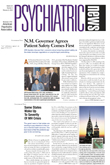The American Psychiatric Foundation is working behind the scenes to help community groups educate the public on mental health issues and the importance of seeking help.
Two groups that recently got financial assistance from the foundation are the Bucks County (Pa.) Crisis Response Team (BCCRT) and the New River Valley Community Disaster Response Coalition in southwest Virginia.
BCCRT sought to increase awareness in schools, churches, police departments, and businesses about the crisis-intervention services it provides.
BCCRT had great success in increasing awareness and delivered a variety of interventions to the community. Such interventions included debriefing bank employees involved in a robbery and employees coping with a shooting incident at their work site. The organization also provided assistance to members of a local chapter of Mothers Against Drunk Driving by debriefing schools during and after special driving-while-intoxicated re-enactments.
The foundation also provided funding to the New River Valley Community Disaster Response Coalition (CDRC). The coalition was formed by Dorinda Miller, Ph.D., of the Academy of Healing Arts Inc. and Amy Forsyth-Stevens of the Mental Health Association of the New River Valley, Va. CDRC consists of several mental health organizations and private practitioners who work together to educate community members about the mental health and emotional consequences of terrorism and disaster.
The CDRC’s efforts have had tangible results. More than 960 people in southwest Virginia benefited from 28 community educational presentations by learning about the impact of terrorism and war, the importance of seeking help, and where to seek help. The CDRC worked to inform students, teachers, school officials, the Retired Seniors Volunteer Program, local congregations, the U.S. Postal Service, and other individuals about mental illness and how to seek care.
Community agencies were enthusiastic about being involved in the CDRC project and building relationships to support the community in the event of a terrorist attack or natural disaster. And, as they had hoped, there is now a growing interest is developing a similar community disaster-response coalition in more remote areas of southwest Virginia.
These grants are just a few examples of how the American Psychiatric Foundation is working to educate the public about mental health issues and the importance of seeking care. More information on the foundation, including how to make a tax-deductible contribution, is posted online at www.PsychFoundation.org. ▪
